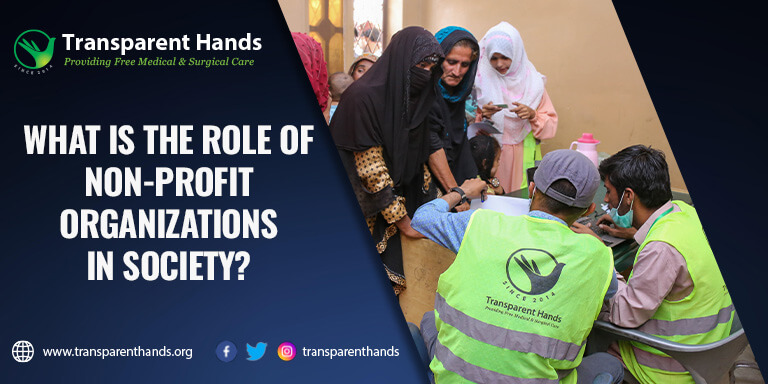What is the Role of Non-Profit Organizations in Society?

In today’s ever-changing world, the role of non-profit organizations in society is crucial and multifaceted in addressing societal challenges, advocating for marginalized communities, and driving positive change. These organizations, fueled by a strong sense of purpose and supported by passionate individuals, tackle a wide range of issues with the aim of creating a better society for all. Let’s delve deeper into the various roles that non-profits play in shaping our communities and making a lasting impact.
The Role of Non-profit Organizations in Society
Advocating for Social Justice and Equality
Non-profit organizations serve as powerful advocates for social justice, standing up for the rights and needs of marginalized and vulnerable populations. They work tirelessly to promote equal opportunities, challenge discriminatory practices, and dismantle systemic barriers that perpetuate inequality. By raising awareness, conducting research, and engaging in policy advocacy, nonprofits amplify the voices of those often unheard, striving to create a society that is fair, inclusive, and just.
These organizations engage in initiatives such as lobbying for policy reforms, organizing protests and demonstrations, and providing legal aid to marginalized communities. These are some important reasons why we all should donate to charity. By advocating for the rights of marginalized groups, nonprofits aim to create a more equitable society where every individual has access to equal opportunities and fair treatment.
Driving Community Development and Empowerment
Nonprofits are catalysts for community development, empowering individuals and promoting sustainable livelihoods. They provide vital resources, training, and mentorship to marginalized groups, enabling them to build the skills and capabilities needed to thrive. Nonprofits work closely with communities to identify their unique needs and develop tailored programs and interventions that address those needs.
These organizations support initiatives such as vocational training programs, microfinance projects, and entrepreneurship development programs. By equipping individuals with the necessary skills and resources, nonprofits empower them to create sustainable livelihoods, break the cycle of poverty, and contribute to the overall development of their communities.
The role of non-profit organizations in society is also to foster social cohesion and cultural preservation by supporting local arts, heritage, and traditions. Through initiatives such as community festivals, art exhibitions, and cultural exchanges, they celebrate diversity and promote a sense of belonging and pride among community members.
Promoting Accessible Healthcare and Well-being
Non-profit organizations play a significant role in promoting healthcare access and improving overall well-being. They work tirelessly to bridge gaps in healthcare services, particularly for underserved populations. Through initiatives such as free medical camps, health education programs, and preventive care campaigns, nonprofits address health disparities, promote healthy lifestyles, and provide essential medical services to those in need.
These organizations collaborate with healthcare professionals, local clinics, and hospitals to provide free or subsidized healthcare services to individuals who cannot afford them. They also focus on raising awareness about preventive healthcare measures, conducting health screenings, and providing essential medications to vulnerable populations. It is the responsibility of every individual in society to donate to charity and help these organizations work better and more effectively for the welfare of the public.
Nonprofits play a critical role in areas such as maternal and child health, infectious disease prevention, mental health support, and access to clean water and sanitation. By partnering with healthcare professionals and leveraging community resources, they ensure that quality healthcare reaches individuals who might otherwise have limited access.
Fostering Research, Innovation, and Collaboration
Nonprofits contribute to the advancement of knowledge and innovative solutions through research and collaboration. They conduct studies, collect data, and analyze trends to better understand complex social issues and identify effective strategies for change. By sharing their findings, nonprofits contribute to evidence-based interventions and guide policy recommendations.
An important role of non-profit organizations in society is to foster collaboration by bringing together diverse stakeholders, including government agencies, businesses, academic institutions, and community organizations. Through these collaborations, they leverage collective expertise and resources to create sustainable solutions that address the root causes of social issues.
Non-profits often establish research centers, innovation labs, and policy think tanks to drive research and development in areas such as climate change, poverty alleviation, education reform, and social entrepreneurship. By fostering a culture of research, innovation, and collaboration, nonprofits contribute to long-term, systemic change.
Mobilizing Resources and Engaging the Community
Non-profit organizations rely on the support and involvement of the community to fulfill their missions. They mobilize resources, including financial contributions, volunteer efforts, and in-kind donations, to make a tangible impact. By engaging individuals, businesses, and institutions, nonprofits create a sense of collective responsibility and empower people to be agents of change.
These organizations often establish fundraising campaigns, corporate partnerships, and donor networks to raise the necessary funds to support their programs and initiatives. They also provide platforms for individuals to donate online or contribute their time, expertise, and resources, fostering a culture of philanthropy and social responsibility.
Nonprofits engage in community outreach, awareness campaigns, and educational initiatives to inspire and mobilize individuals toward positive action. They organize volunteering opportunities, youth leadership programs, and advocacy training to empower individuals to actively participate in social change.
Conclusion
Non-profit organizations play a vital and multifaceted role in addressing social challenges, promoting equality, and driving positive change in society. Through their advocacy, community development initiatives, healthcare efforts, research, and resource mobilization, nonprofits shape a more inclusive and compassionate world. However, the impact and role of non-profit organizations in society is greatly amplified by the collective support and involvement of individuals and communities. By joining hands with non-profits, we can create a society that embraces social justice, empowers the marginalized, and works towards a brighter future for all.










Leave Your Comments